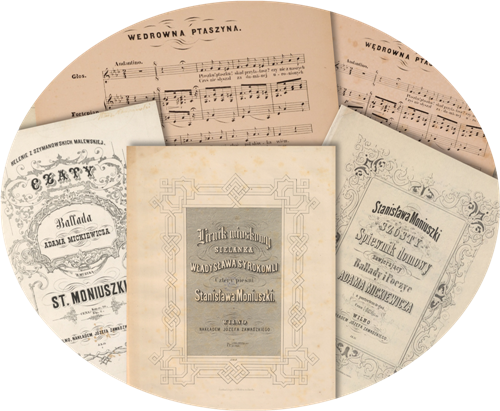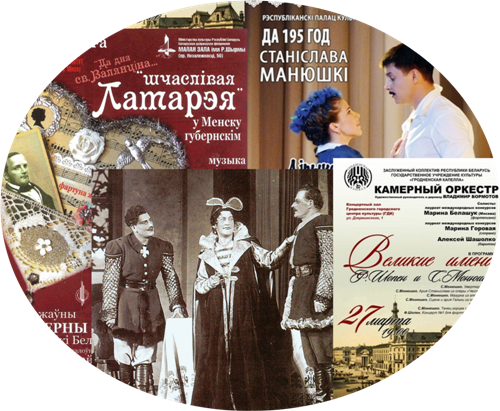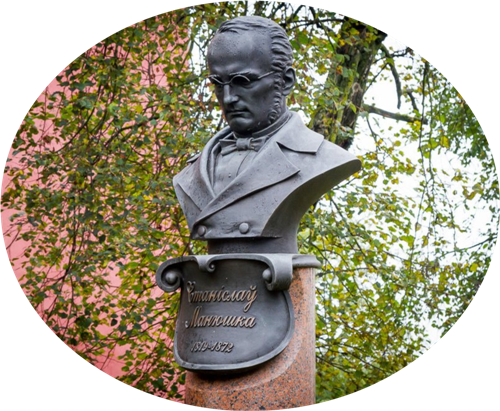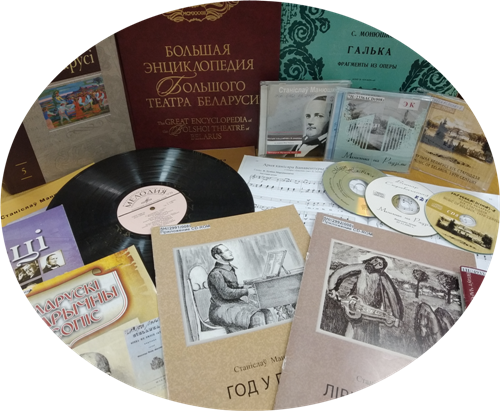Stanislaw Moniuszko in the Belarusian culture
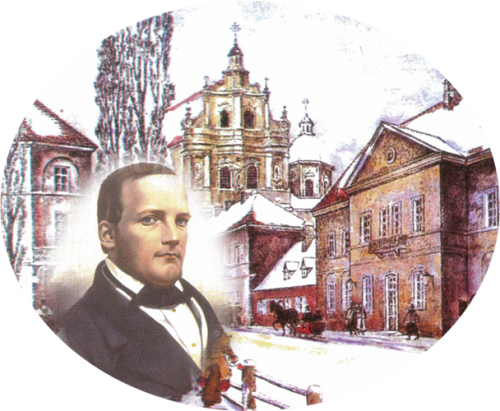
Stanislav Moniuszko was, remains and always will be the pride of our Belarusian land, its culture, which has raised, inspired him and felt all the beauty and spirituality of his lyre.
O. Dadiomova
The Moniuszko noble family had long been famous for their support of the cultural and educational development of Belarus. All members of the family had a good education and were multi-talented people. The composer’s uncle, Dominik Moniuszko, was a known patron of arts; his other uncle, Kazimierz, was a notable botanist. Many ancestors and relatives of Stanislaw Moniuszko were true patriots of their land; they took care of the maintenance of cultural heritage and were engaged in the formation of manors and parks.
Drawings of Czeslaw Moniuszko
The composer’s father, Czeslaw Moniuszko, was a poet and amateur painter, whose drawings reflect Minsk of the mid-nineteenth century. His mother, Elzbieta Madziarska, was a musically gifted woman and took lessons from the famous Minsk musician and composer, Peter Caraf-Korbut, who played 24 instruments. Her great-grandfather had founded the manufacture of famous Slutsk belts. Such were the family roots, which, along with noble origin, high culture and thorough knowledge were inherited by the composer, whose name is known and respected throughout the world.
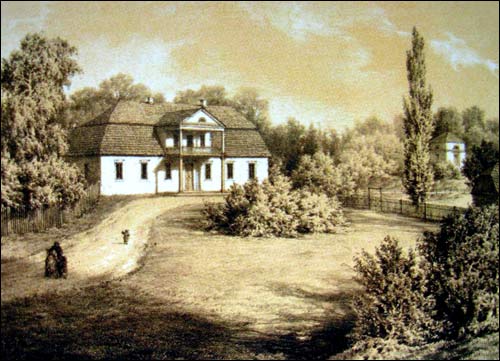
Napoleon Orda. The Farm in Ubel. 1856–1883
Having inherited the estate in Ubiel, that was not far from the towns of Smilovichy and Igumen (in present-day Cherven), Czeslaw Moniuszko and his wife settled in a new place, where on May 5, 1819, our famous compatriot was born. The child was named Stanislaw Jan Edward Kazimierz. A copy of vital records (birth certificate) of the Smilovichy parish church is kept in the National Historical Archives of Belarus.
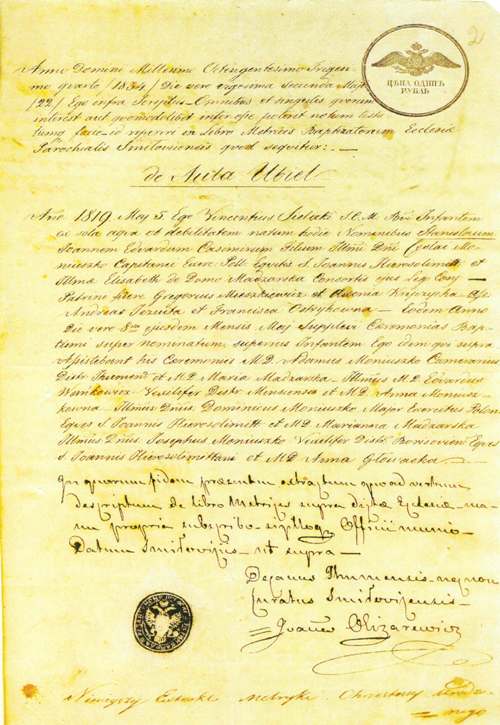
Stanislaw Moniuszko’s birth metric. May 5, 1819
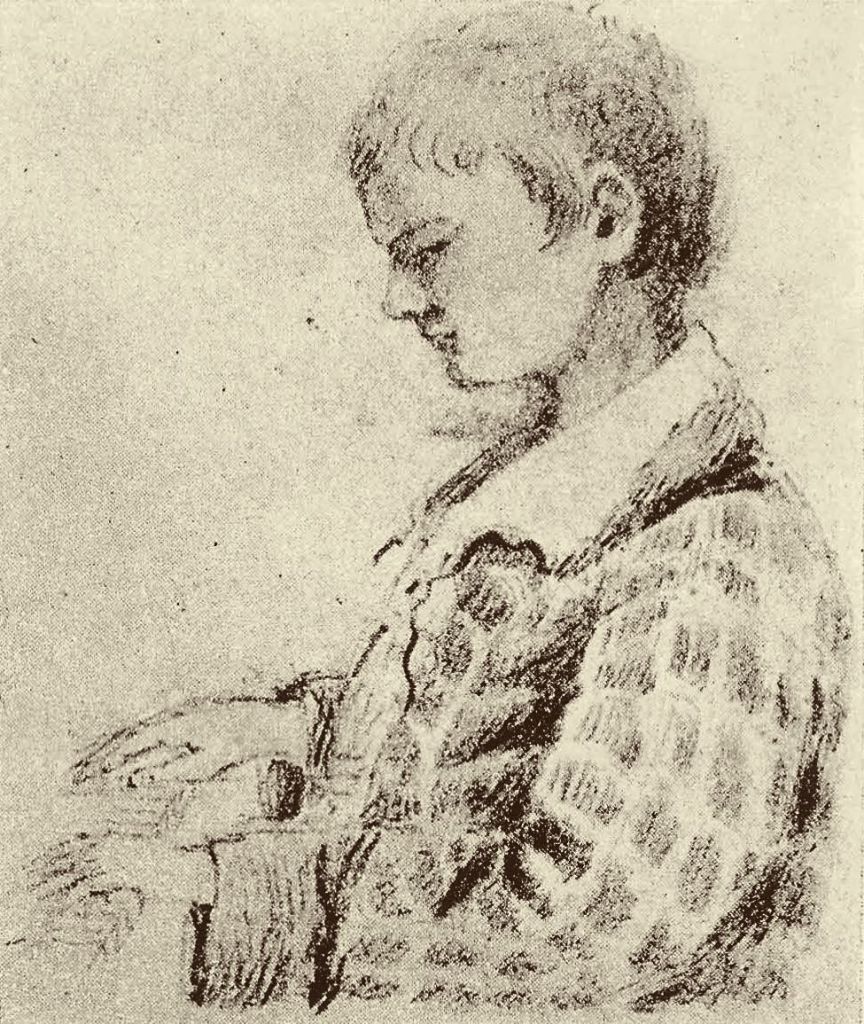
Five-year-old Stanislaw at the piano
The composer spent his youth in the open country, close to the beautiful nature of Belarus. From childhood, he had heard peasants singing and quickly memorized their songs. According to Polish music historian Wladislaw Fabra, those villagers’ songs became the seed from which later his famous opera Halka grew. The peasant parties, which were held in his uncle Jozef’s estate in Smilovichy, were a real treat for young Stanislaw. He was so impressed with the old castle and its legends that, many years later, immortalized them in his meaningful opera The Haunted Manor.
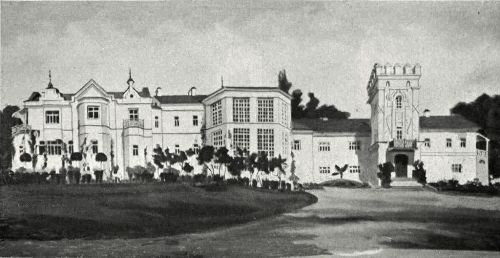
The Moniuszkos’ Palace in Smilovichi. 1917
Stanislaw got the initial musical education from his mother, and theatrical evenings that were held almost daily in the parental home become a kind of foundation on which Moniuszko’s talent for music and drama was formed.
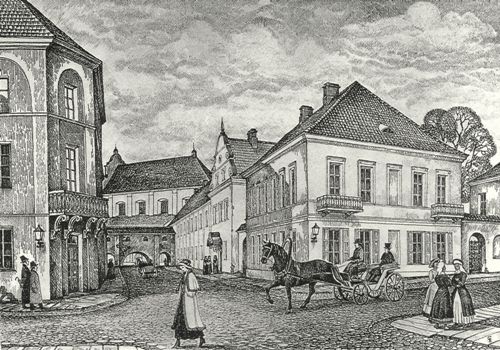
Victor Stashchenyuk. The house where Stanislaw Moniuszko lived. 1986. Lithograph
In 1827, the Moniuszko family moved to Warsaw, where Stanislaw attended the Piarists School and took music lessons from August Freyer. In 1830, the Moniuszkos returned back to their homeland and settled in Minsk, where they lived on Vysoki rynok (in present-day Svobody Square).
Minsk in the mid 19th century
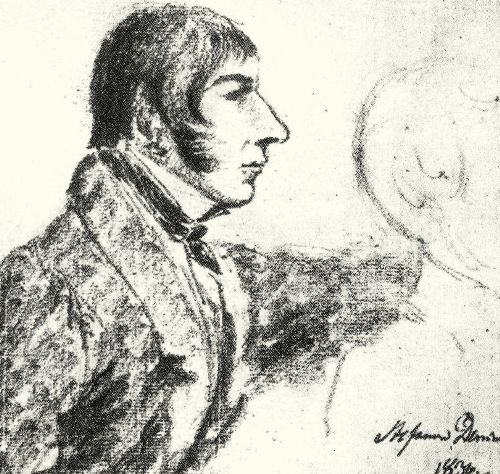
Dominic Stefanovich
Stanislaw studied at Minsk gymnasium (in present-day a building on Internacionalnaya Street, 19) and took music lessons from the famous local teacher, head of Minsk Orchestra, Dominic Stefanovich. Many years later, in 1856, Moniuszko, looking back on his life's journey, wrote in a letter to Adam Kirkor: "My teachers of piano music were: my mother in the village, famous organist Freyer in Warsaw, and my precious Dominic Stefanovich in Minsk. The latter, in love with his art, was able to assess my striving for music and turn it to my advantage. Since then, music has become for me the most important goal."
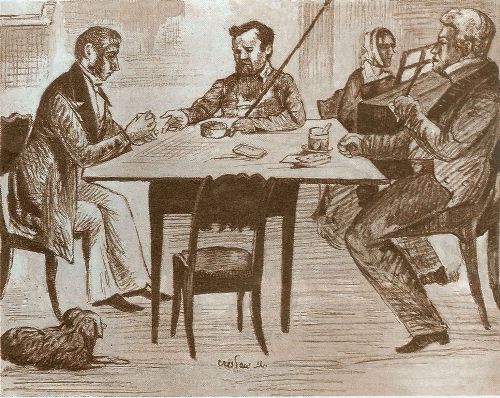
The Moniuszkos’ house in Minsk. The 1830s
The Moniuszkos’ friendly apartment had soon become a kind of art gallery, where almost daily, at the initiative of the composer's mother, Minsk intellectuals, musicians, actors and artists gathered: Walenty Wankowicz, Jan Damel, Peter Karufa-Korbut, Dominic Stefanovich and other contemporaries and friends of the family.
In 1840, after a period of professional training in Berlin under the supervision of the Director of the Academy of Music, Professor Carl Friedrich Rungenhagen, Moniuszko moved to Vilna, where he worked as an organist of St. John's church. At this time, the composer married Alexandra Mueller and started a family. Having met in their youth and fallen in love, they remained faithful to each other and lived together for thirty years. Their romantic relationships are reflected in numerous letters. Correspondence: 1826–1851, the Moniuszkos’ epistolary heritage, was translated from Polish into Belarusian and published by literary critic and writer Jazep Yanushkevich.
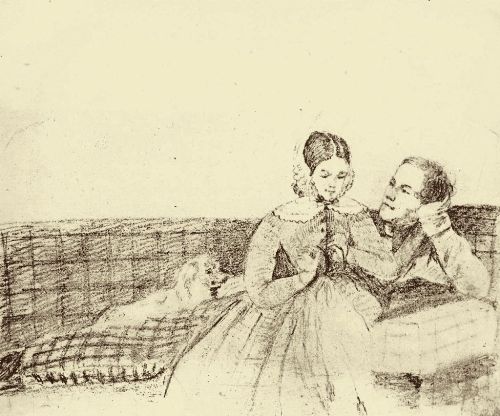
Stanislaw and his wife Aleksandra
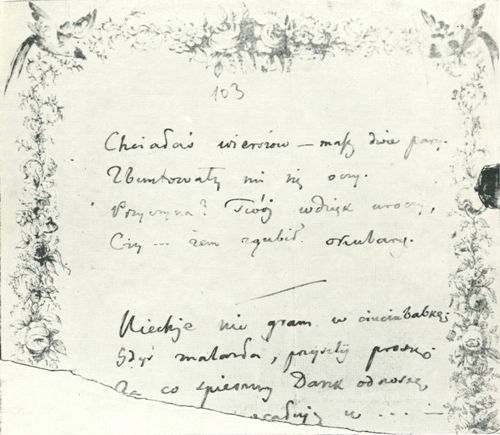
Poetic fragment of a letter to his wife. 1837
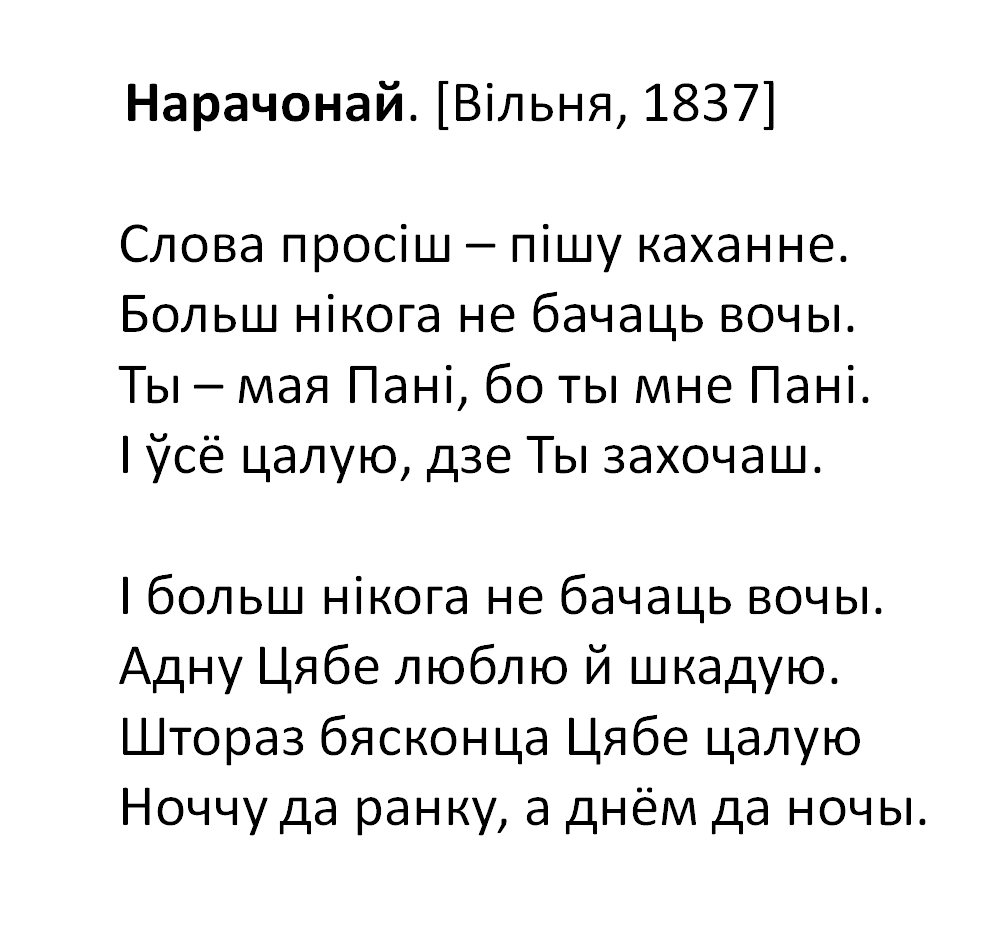
Poetic fragment of a letter in the translation of Alesia Chobata
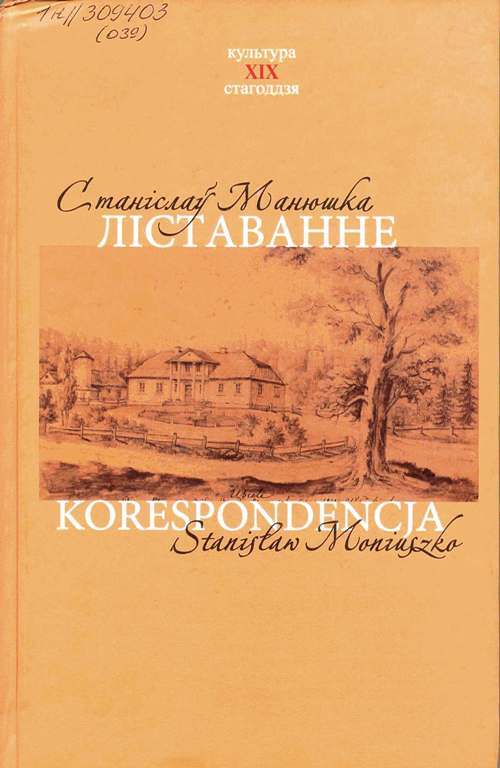
S. Moniuszko. "Correspondence: 1826–1851". Compiled by – J. Yanushkevich. 2010
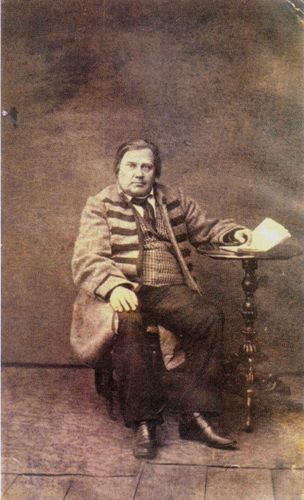
Vincent Dunin-Martsinkevich. 1850s
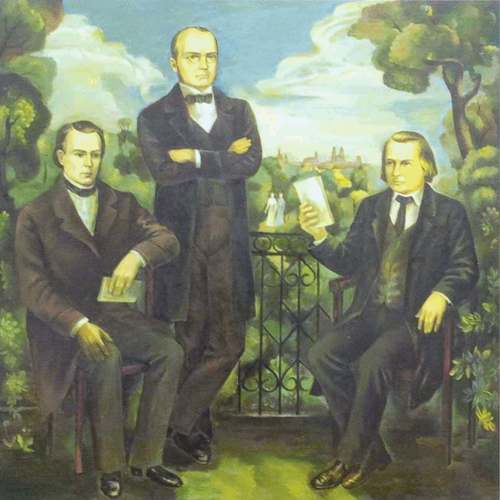
Victor Barabantsev. Friendly meetings (V. Syrokomlya, S. Moniuszko, V. Dunin-Martsinkevich). 1983
The next 18 years of Stanislaw Moniuszko’s life were filled with productive work. He worked as a conductor, teacher and composer, and it should be noted that biographers and music historians call this very important period of “Minsk and Vilna”. This time is marked by creative relationships, numerous meetings and trips to the parents, relatives and friends in Minsk. Each visit of Moniuszko became a holiday for Belarusian creative elite. Here he collaborated with the prominent figures of national culture: Tomasz Zan, Jan Chachot, Adam Kirkor, Vladislav Syrakomlya, Florian Miladovsky, Camilla Marcinkiewicz, sincerely helping his fellow countrymen and musicians. His theatrical and musical plays were first staged here. Numerous operettas were written and prepared for staging in Minsk between 1841 and 1851. The composer collaborated with Belarusian playwright Vincent Dunin-Marcinkiewicz, who was the author of The Miraculous Water, Conscription, The Competition of Musicians, as well as the famous Sielanka (Idyll), in which, for the first time in the history of opera, the Belarusian language sounded onstage. Dunin-Marcinkiewicz highly appreciated Moniuszko as a friend and musician, considering him a true master, "the Bard" of Belarusian culture. In 1856, on the occasion of the composer’s visit, he wrote a poem on behalf of their joint "peasant" hero Naum Pryhavorka, in which the following lines are dedicated to Moniuszko: "The third piper has grown among us, he is our brother, and the land of Minsk is his mother!"
In the same period Moniuszko created the first two-act edition of the opera Halka, which brought him international fame and was first staged in Vilna. The period of Minsk and Vilna was a time of high creativity, when the composer wrote music in various genres: symphony, opera, chamber-instrumental, chamber and vocal music, cantata and oratorio. Many works of Stanislaw Moniuszko are based on Belarusian folklore and the poetry of his countrymen.
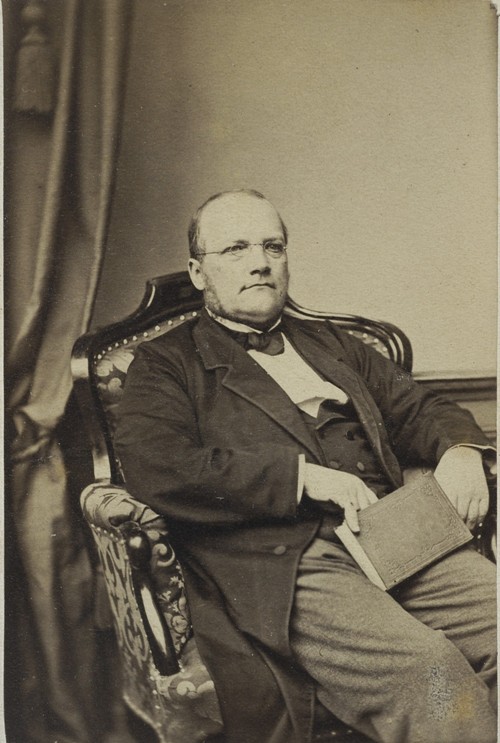
Stanislaw Moniuszko. A photo. 1865
In 1858, the composer moved to Warsaw, where he became a real classic of the Polish opera. There he realized his creative vision; his music was performed onstage, and the composer became world famous. As a conductor at the Bolshoi Theater in Warsaw, the composer worked very hard writing operas, cantatas and other works of different genres, all imbued with the spirit of Belarusian folk music. Living in Warsaw, Stanislaw Moniuszko often visited Minsk. He contributed to the development of the national theatrical art and was interested in the works of his countrymen. Through a spiritual connection with his people, countrymen and the best representatives of Belarusian intelligentsia, Stanislaw Moniuszko kept in touch with the homeland, its history and culture.
Stanislaw Moniuszko died unexpectedly on June 4, 1872. Thousands of people attended the funeral cortege. The operas remained unfinished, and plans unrealized... A great mountain of wreaths grew over the composer’s grave, and, nearby, someone put a modest bouquet of cornflowers. Apparently, they were brought from far away, as the flowers faded a little. The inscription on the black ribbon said: "Stanislaw Moniuszko, the son of the Land of Belarus. She is orphaned and cries over this grave."
The composer was gone, but his oeuvre lives. Year after year, his heritage is gaining more and more interest in listeners and researchers; his works are performed at concerts and put on stages all over the world. Stanislaw Moniuszko is among the greatest figures in the history of Belarus, Poland and Lithuania, and his music represents and unites the cultures of these countries.
Home

















































